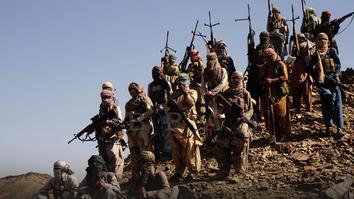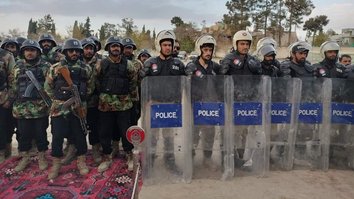QUETTA -- The Iranian regime actively attempts to portray itself as an ally to Pakistan but continues to undermine the country's security by backing militant groups, Pakistani defense and intelligence officials say.
Pakistani Chief of Army Staff (COAS) Gen. Qamar Javed Bajwa on November 18 visited Tehran as a part of Pakistan's continuing efforts for regional peace and stability and border security, according to Inter Service Public Relations (ISPR).
"Pakistan is keenly working to strengthen its ties with neighbouring countries, and Bajwa's recent visit to Tehran was also a part of these efforts. However, the Iranian conspiracies against Pakistan continue," a Rawalpindi-based senior Foreign Ministry official said on the condition of anonymity.
"Our border with Iran is very porous and sensitive, and militant groups involved in terrorism on our soil have several safe havens on Iranian soil. Anti-Pakistan separatist elements are enjoying the support of Iranian border security forces", he said.
Relations between Pakistan and Iran have always been strained by Iranian double standards, and Iranian forces are openly violating the rules of bilateral engagement, he said.
"We have conveyed our reservations to the Iranian government different times, but they are not taking any steps for the elimination of anti-Pakistan elements," he added.
"Iran-based anti-Pakistan militant groups, including the Baloch Liberation Front (BLF), are largely involved in cross-border terrorism. Recently on November 19, militants of BLF, after attacking Pakistani construction personnel at the Buleda area of Turbat District of Balochistan, fled back to a bordering area of Iran," he said.
"In Balochistan Province, Iran-linked militant groups are now jointly operating under a new name, Baloch Raji Aajoi Saangar (BRAS). This new umbrella group represents different banned militant Baloch organisations, and the training camps of the new alliance are inside Iran's bordering areas," said Kashif Javed, a Turbat-based senior security official.
"The main agenda of BRAS is to foil foreign investment in Pakistan, and we have observed an increase in the attacks of this militant group as development work via CPEC is moving forward in Gwadar and other coastal areas of Balochistan," he said, referring to the China–Pakistan Economic Corridor.
In July, BRAS targeted Pakistani Navy and Coast Guard personnel travelling on buses in the Turbat area of Balochistan, he noted.
"Our law enforcement agencies are taking every possible step to counter the anti-peace agenda of militants," he said. "A large number of militants, including their key commanders, have been killed in counter-insurgency strikes so far in restive areas of Balochistan."
"Our investigations confirmed that in the past couple of years several major attacks carried out on our soil were directly facilitated from Iran. Some suspects held here during different operations revealed that they received weapons and other supplies from the Iranian side of the border," he added.
Opposing Pakistan's development
The Iranian regime and other anti-Pakistan elements see CPEC as adverse to their strategic interests, according to Maj. (ret.) Omar Farooq, an Islamabad-based senior defence analyst.
"The twin ports in Gwadar, Pakistan, and Chabahar, Iran, are on Baloch soil, and [Baloch militants] have several concerns about these projects. Anti-Pakistan elements are using Baloch militants to thwart the development work at the Gwadar port," he said.
"The border between Pakistan and Iran is more than 900km long, and a large barren desert area of that border has no population. Pakistan is fencing its border with Iran, but Iranian authorities are not taking sufficient steps for the security of its border," he said.
The Iranian regime must address its problems rather than interfering in the affairs of neighbouring countries, he said.
"There have been clashes between the Iranian government and some Iranian Baloch leaders, and that regional issue has nothing to do with Pakistan," Farooq noted.
A few months earlier, Pakistan also exchanged confidential information with Iranian authorities that identifies the training centres of anti-Pakistan elements across the border, according to Farooq. However, Iranian forces took no action.
"In my opinion, Pakistan-Iran relations must also be viewed in the context of Pak-Saudi relations, because Saudi investment is increasing in our country and accordingly we are moving away from Iran," said Nadeem Ahmed, a Quetta-based security analyst.
"Iranian involvement in Pakistani internal affairs is creating mistrust between the two countries, and in the past couple of years Iran has done nothing in response to what Pakistan has done to strengthen bilateral ties," he said.
The Pakistani-Iranian rivalry could push this region into a new conflict; therefore, both countries should ensure that their land is not used against each other, he said.
"Balochistan is home to a long-running insurgency by different Baloch militant groups aiming for independence, and Iran is using that factor against Pakistan," he said.

![Pakistani Chief of Army Staff Gen. Qamar Javed Bajwa shakes hands with Iranian President Hassan Rouhani in Tehran on November 18. [ISPR]](/cnmi_pf/images/2019/12/10/21295-ejvl2ulwoaauril-585_329.jpg)







Both countries need better coordination rather than mutual recrimination.
Reply6 Comment(s)
Agreed ! that’s how Iranian conspiracy theory works .
Reply6 Comment(s)
I think this article is a part of fifth generation war. Don’t spread hatred. It would be so kind of you.
Reply6 Comment(s)
Poor and negative thinking
Reply6 Comment(s)
Biased opinion
Reply6 Comment(s)
You are right... Iran doesn't want Pakistan or any other country prosper at all and Iran wants Pakistan and other Muslim countries to stuck in insurgency.
Reply6 Comment(s)